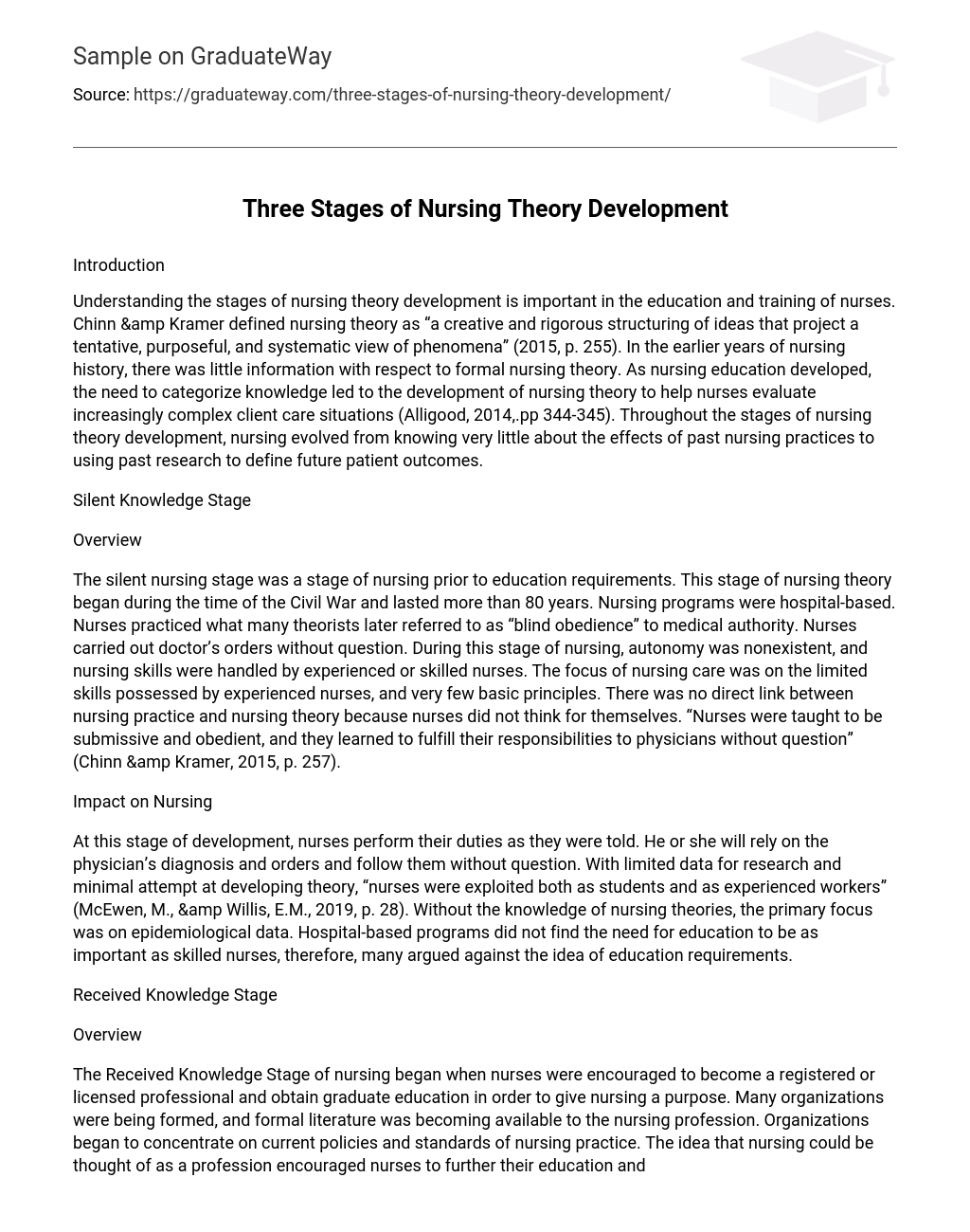Introduction
Understanding the stages of nursing theory development is important in the education and training of nurses. Chinn & Kramer defined nursing theory as “a creative and rigorous structuring of ideas that project a tentative, purposeful, and systematic view of phenomena” (2015, p. 255).
In the earlier years of nursing history, there was little information with respect to formal nursing theory. As nursing education developed, the need to categorize knowledge led to the development of nursing theory to help nurses evaluate increasingly complex client care situations (Alligood, 2014,.pp 344-345). Throughout the stages of nursing theory development, nursing evolved from knowing very little about the effects of past nursing practices to using past research to define future patient outcomes.
Silent Knowledge Stage
Overview
The silent nursing stage was a stage of nursing prior to education requirements. This stage of nursing theory began during the time of the Civil War and lasted more than 80 years. Nursing programs were hospital-based. Nurses practiced what many theorists later referred to as “blind obedience” to medical authority. Nurses carried out doctor’s orders without question. During this stage of nursing, autonomy was nonexistent, and nursing skills were handled by experienced or skilled nurses.
The focus of nursing care was on the limited skills possessed by experienced nurses, and very few basic principles. There was no direct link between nursing practice and nursing theory because nurses did not think for themselves. “Nurses were taught to be submissive and obedient, and they learned to fulfill their responsibilities to physicians without question” (Chinn & Kramer, 2015, p. 257).
Impact on Nursing
At this stage of development, nurses perform their duties as they were told. He or she will rely on the physician’s diagnosis and orders and follow them without question. With limited data for research and minimal attempt at developing theory, “nurses were exploited both as students and as experienced workers” (McEwen, M., & Willis, E.M., 2019, p. 28). Without the knowledge of nursing theories, the primary focus was on epidemiological data. Hospital-based programs did not find the need for education to be as important as skilled nurses, therefore, many argued against the idea of education requirements.
Received Knowledge Stage
Overview
The Received Knowledge Stage of nursing began when nurses were encouraged to become a registered or licensed professional and obtain graduate education in order to give nursing a purpose. Many organizations were being formed, and formal literature was becoming available to the nursing profession. Organizations began to concentrate on current policies and standards of nursing practice.
The idea that nursing could be thought of as a profession encouraged nurses to further their education and obtain more knowledge about nursing theories. Not all theories in nursing are exclusive nursing theories “many are borrowed or shared with other disciplines” (Fawcett & DeSanto, 2013, p. 17).
Impact on Nursing
Received knowledge resulted from theories borrowed from other disciplines. Many nurses were becoming educated in other fields. Because of the lack of nursing theory available, nurses relied on the past research of psychologists, sociologists, and other disciplines to provide answers to nursing issues. The primary focus of nursing was education, and education was moved from the hospital setting into universities.
Due to the increasing nursing shortage, professional organizations were restructured. “It was also during this time that state licensure testing for registration took effect, and by 1949, 41 states required testing (Kalisch & Kalisch, 2004, p. 30). With the help of organizations such as the journal Nursing Research, and The American Nurses Association (ANA), nursing began to focus more on education and preparing nurses for administrative duties.
Constructed Knowledge Stage
Overview
During the Constructed Knowledge Stage of theory development, many scholars were seeking to find meaning in nursing. Many focused on developing theories with research. Applied theory in research and practice was the primary focus during the constructed knowledge stage. According to McEwen & Willis, evidence-based practice (EBP) was introduced into nursing to, ‘address the widespread recognition to move beyond attention given to research per se in order to address the gap in research and practice” (p. 31).
Impact on Nursing
In addition to patient benefits from EBP, McEwen & Willis noted that “EBP promotes employment of theory-based, research-derived evidence to guide nursing practice (2019, p. 28). EBP allows nurses to make decisions based on knowledge supported by research. By following EBP guidelines, nurses use past outcomes to provide the best care for their patients.
Some benefits of EBP include better patient outcomes, more current nursing practices, and better decision making. A universal example of evidence-based practice is handwashing. It has been proven time and again, by laborious research that standard handwashing reduces the rate of infection. Surprisingly, it took decades and multiple studies for medical professions to accept that handwashing is vital in preventable infection.
References
- Alligood, Martha Raile, ed. (2014-01-01). Nursing theory: utilization & application (5 ed.). St. Louis, Missouri: Elsevier Mosby. ISBN 9780323091893Chinn, P. L., & Kramer, M. K. (2011). Integrated theory and knowledge development in nursing (8th ed.). St. Louis, MO: Mosby/Elsevier.
- Fawcett, Jacqueline & DeSanto-Madeya, Susan (2013). Contemporary Nursing Knowledge. Analysis and evaluation of nursing models and theories. Philadelphia: F.A. Davis Company. ISBN 978-0-8036-2765-9
- Kalisch, P.A., & Kalisch, B.J. (2004). The advance of American nursing (4th ed.). Philadelphia, PA: Lippincott Williams & Wilkins.
- McEwen, M., & Willis, E.M. (2019). Title of chapter. In Theoretical basis for nursing (5th ed. pp.). Philadelphia, PA: Wolters Kluwer Publishing.





